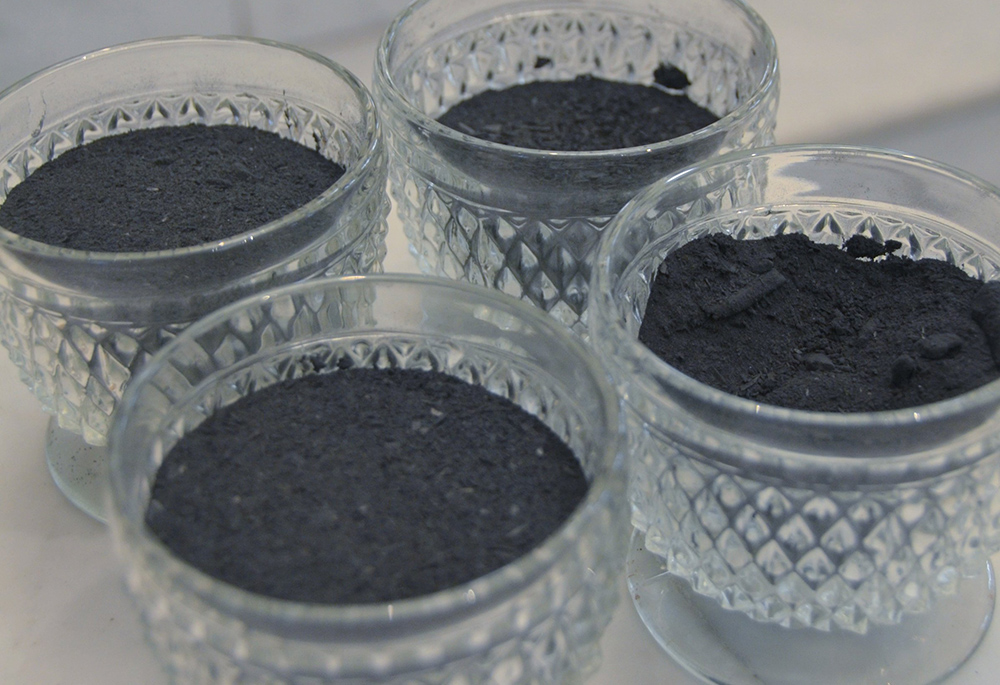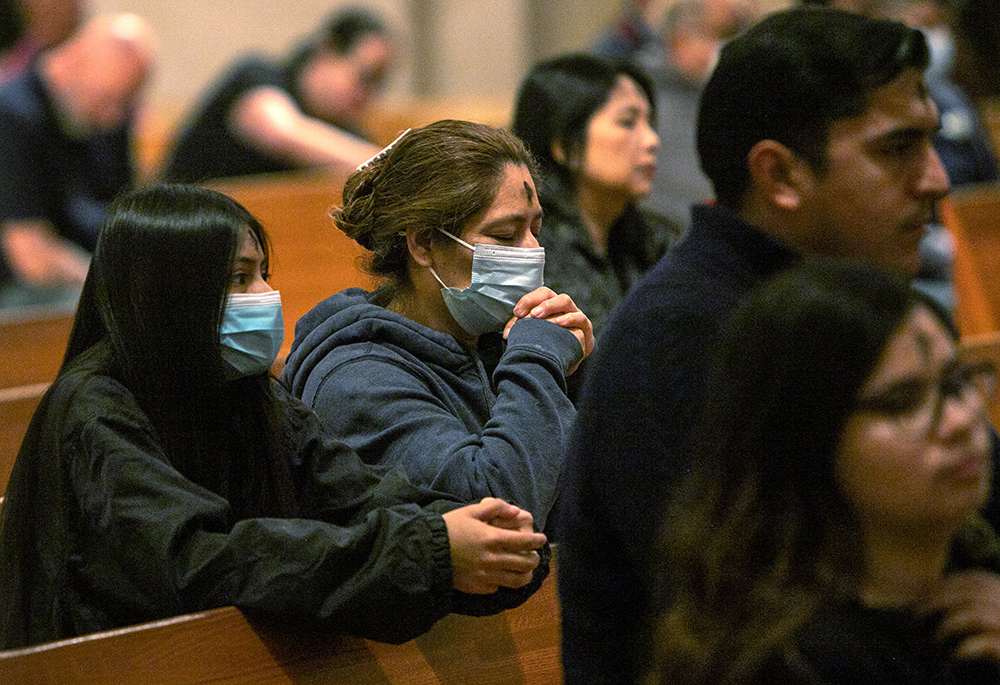
Ashes are seen during Ash Wednesday Mass at the Cathedral of the Immaculate Conception March 2, 2022, in Portland, Maine. (CNS/Courtesy of Diocese of Portland)
Today is Ash Wednesday, arguably the most distinctively Catholic day of the year. Today Catholic men and women of all ages and occupations will walk down the street or into a restaurant with a dark smudge on their forehead, as if there were nothing more natural in the world.
Ash Wednesday is not a holy day of obligation, but it always draws larger crowds than any celebrations, save Christmas and Easter. All Saints' Day and the feast of the Immaculate Conception are holy days of obligation, and most parishes see more communicants than a typical weekday, but nothing like the standing-room-only crowds of Ash Wednesday.
Why the crowds?
It has something to do with cultural habit, of course, but most Catholics have abandoned other cultural tics: We get divorced at the same rate as non-Catholics, our politics tends to dictate our religious beliefs not the other way round, and while certain foods still mark the feast days of our ethnic Catholic subculture, going to Mass for the feast of St. Sebastian is no longer a must.
Ash Wednesday is different. Those crowds are an expression of the sensus fidei, as popular piety almost always is. Catholics, at least until very recently, were raised with a bit of fire and brimstone, not of "Inherit the Wind" proportions, but enough to remind us that American notions of human progress lack biblical warrant. The people of God know we need to repent. We know, too, that we are dust and unto dust we shall return. And we sense that the transcendent God of the universe is very close to us, especially when we repent.
Advertisement
The people of God know that the drama of salvation is accessible, tangible, like the ashes put on our foreheads or the water of baptism at the Easter Vigil. We know that confessing our belief in a redeemer begs the question: redeemed from what? And we know the answer to that question is sin. In all our modern sophistication, it still takes only the tiniest bit of honesty to recognize the sins of the world and the sins in our own hearts, sins of the flesh and sins of the spirit, sins of injustice and of indifference and of concupiscence. All sins that require redemption. Sins that require confession. Sins that require atonement.
Sackcloth and ashes are not very modern, but there is something in the Christian psyche that knows we have need of them, dare I say that we deserve them. "Thoroughly wash away my guilt; and from my sin cleanse me," sings the psalmist. "For I know my transgressions; My sin is always before me."
All that brings us to church on Ash Wednesday.

People attend Ash Wednesday Mass at the Co-Cathedral of the Sacred Heart March 2, 2022, in Houston. (CNS/Texas Catholic Herald/James Ramos)
When I was growing up, our CCD teacher one year told us that instead of giving something up for Lent, we were going to do something positive. How thoroughly American. Even though I couldn't have been more than 9 or 10 at the time, I was deeply suspicious. It did not make sense to me that if we were called to follow Christ, whose image hung on the cross over the tabernacle, we should not expect to have to learn how to forfeit something too. I knew that a follower of Christ needed to cultivate at least some ascetic sensibilities.
I was too young to know the word "solipsistic" but I would come to recognize later that this focus on what we do, instead of what God does, is a hallmark, perhaps the hallmark, of late 20th- and early 21st-century spirituality. I would come to learn that my well-intentioned CCD instructor was at least materially a Pelagian. I would recognize that Joel Osteen and his "prosperity Gospel" is the most fraudulent expression of Christianity since Gnosticism. I would learn that the vow of poverty is every bit as important as the vows of chastity and of obedience, and that all three were intermingled in Christ in a way that actually freed him and therefore freed those who choose to follow him most radically. Better to say, those who recognize he had chosen them.
Poverty is why we come to Mass on Ash Wednesday. Poverty as self-emptying, which is the essential, inescapable quality of Jesus' redemptive power. We like to see Jesus as the liberator, the fighter against injustice, and he is, but that is not the dominant theme in the Gospels. The dominant and essential theme is Jesus' self-emptying. It is that which most characterized his salvific ministry and most caught the attention of his early followers. Poverty of spirit. Poverty as the opposite of, and antidote to, Pelagianism. Poverty as essential to the Christian vocation given us at baptism. Poverty, chastity and obedience, all together, as the most fitting responses to the grace Christ imparts to us from the cross.
The church is in the middle of a wonderful synodal process. Literally wonderful, full of wonder. We rightly turn to theologians to help us understand the challenges and the opportunities this ecclesial moment present. And so we should. But there is something to what Paul said to us at Mass a couple of weeks back: "When I came to you, brethren, I did not come proclaiming to you the testimony of God in lofty words or wisdom. For I decided to know nothing among you except Jesus Christ and him crucified" (1 Corinthians 2:1-2).
Today, that smudge on our foreheads speaks to the sensus fidei as eloquently as any theological tract. It speaks to our yearning to grow closer to Jesus Christ and him crucified, mindful that he alone can conquer sin and death, that he has in fact already conquered sin and death. We Catholic Christians love Lent because we need it.







